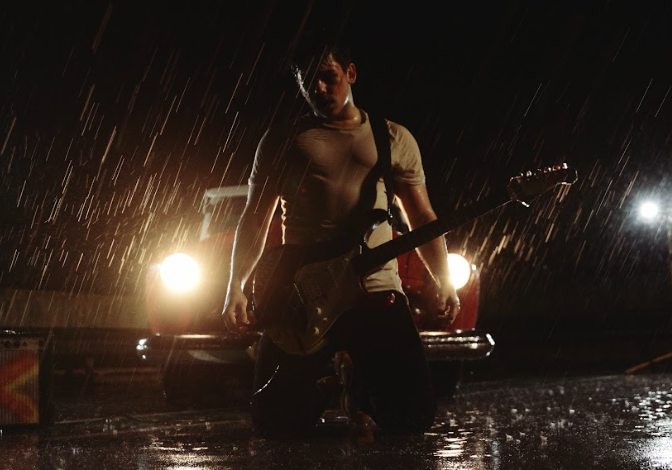Imbermind, the cutting-edge musical project that blends electronic purity with alternative pop, has released their highly anticipated debut album, Never Ending. We caught up with Imbermind to discuss all things music below.
You all come from very different professional backgrounds—how did Imbermind first come together as a project?
Imbermind began as an idea that Edu Imbernón had been carrying with him for quite some time. He wanted to create a band project that went beyond the club scene—something more emotional, more cinematic. The spark really happened when he teamed up with Luis Clemente to work on a remix for Depeche Mode. During those sessions, something clicked creatively. We realized there was potential for a deeper musical dialogue—something that blended their worlds in a way that felt honest and new. That initial connection led them to bring in Nico Casal, with his background in film scoring, and Álvaro Monreal, whose voice brought a raw, intimate edge to the music. From there, Imbermind was born—not just as a collaboration, but as a fully-formed band project rooted in emotion, atmosphere, and contrast
With four strong creative voices involved, how do you manage the decision-making process in the studio?
It’s a balance of trust and listening. We all have different instincts, but there’s mutual respect—no one’s trying to dominate the room. If anything, the challenge is knowing when to stop, not when to speak. We give space for ideas to breathe, and often the best decisions are the ones that surprise all four of us. The studio is a dialogue, not a debate.
Nico, coming from film scoring, and Edu, with your DJ background—how do you merge those two very different approaches to rhythm and atmosphere?
We meet in emotion. Nico brings narrative and space, while Edu brings pulse and texture. What we’ve found is that film music and electronic music are actually closer than they seem—both are about creating atmosphere and movement. The contrast between them becomes a strength: one stretches time, the other grounds it. We build bridges between introspection and drive.
How do you divide roles in production—do you each have fixed responsibilities or is it more fluid?
It’s fluid by design. Some days Álvaro starts something on guitar or voice, and other times it’s a synth line from Luis or a beat from Edu that sets the tone. Nico might develop a harmony or cinematic element that shifts the whole direction. We’re not precious about roles—we chase what feels honest and let the track tell us what it needs.
Your remix of Depeche Mode’s “Wagging Tongue” was a huge moment. How did that opportunity come about, and what did it teach you?
It was surreal, honestly. Depeche Mode are legends, and getting that call felt like a real moment of validation. The process taught us the power of restraint. We didn’t want to overshadow the original —we wanted to reimagine it respectfully, with our DNA. It was a masterclass in honouring legacy while adding our voice to the conversation.
What were the biggest technical challenges in bringing Never Ending to life, and how did you overcome them?
Finding cohesion. With so many influences—electronic, classical, indie, cinematic—it was easy to lose direction. We spent a lot of time on sonic identity: how the drums should feel, how much space vocals needed, how to glue everything together without diluting the contrasts. We ended up building a custom sample library from our own recordings to give the album a shared language.
Álvaro, as the primary vocalist, how do you tailor your performance to match such varied sonic landscapes?
I try to become the emotion of each track. Some songs ask for fragility, others for intensity or distance. I don’t approach them all the same way—I let the production guide my phrasing, tone, and presence. It’s almost like acting: you inhabit a space and respond to it, rather than trying to control it.
Luis, you’ve worked heavily in indie—how did that shape the melodic structures or arrangements of the album?
Indie tends to embrace imperfections and tension in melody, and I think that sensibility helped keep Never Ending from becoming too polished. I like lines that feel like they might fall apart, or arrangements that shift unexpectedly. That contrast—between electronic precision and human imperfection—became a key part of the Imbermind sound.
What does success look like for Imbermind in 2025? Festivals, sync, critical acclaim?
All of that would be amazing, of course. But for us, success means depth over scale. If one person listens to a track and it becomes part of their personal landscape, that’s worth everything. That said, we do want to bring this project to live audiences—festivals, audiovisual shows, collaborations. We want the music to exist off-screen, in real space.
Looking ahead, how do you plan to translate this immersive sound into a live experience?
We’re building something hybrid—a mix of live performance, visuals, and electronic setup. It won’t be a standard band or a DJ set. It’ll be immersive, emotional, and dynamic. We want people to feel like they’re inside the music, not just watching it. Every detail—from the lights to the transitions—will serve the mood we create.
INSTAGRAM | TIKTOK | BANDCAMP | RESIDENT ADVISOR | YOUTUBE | SPOTIFY


